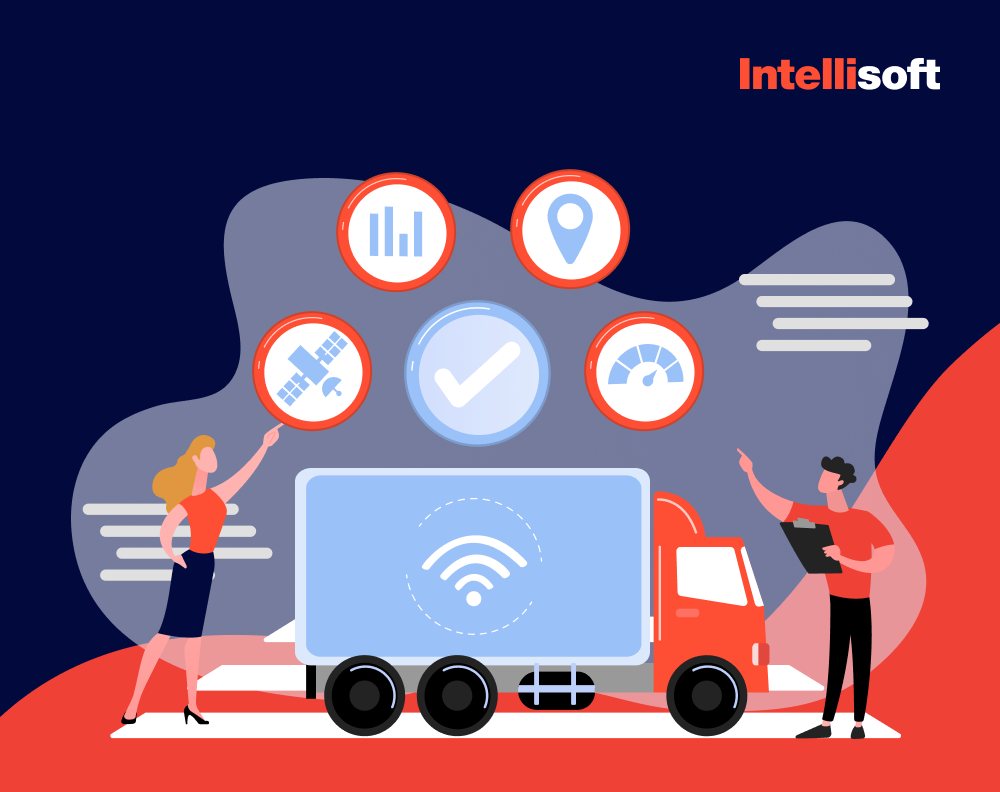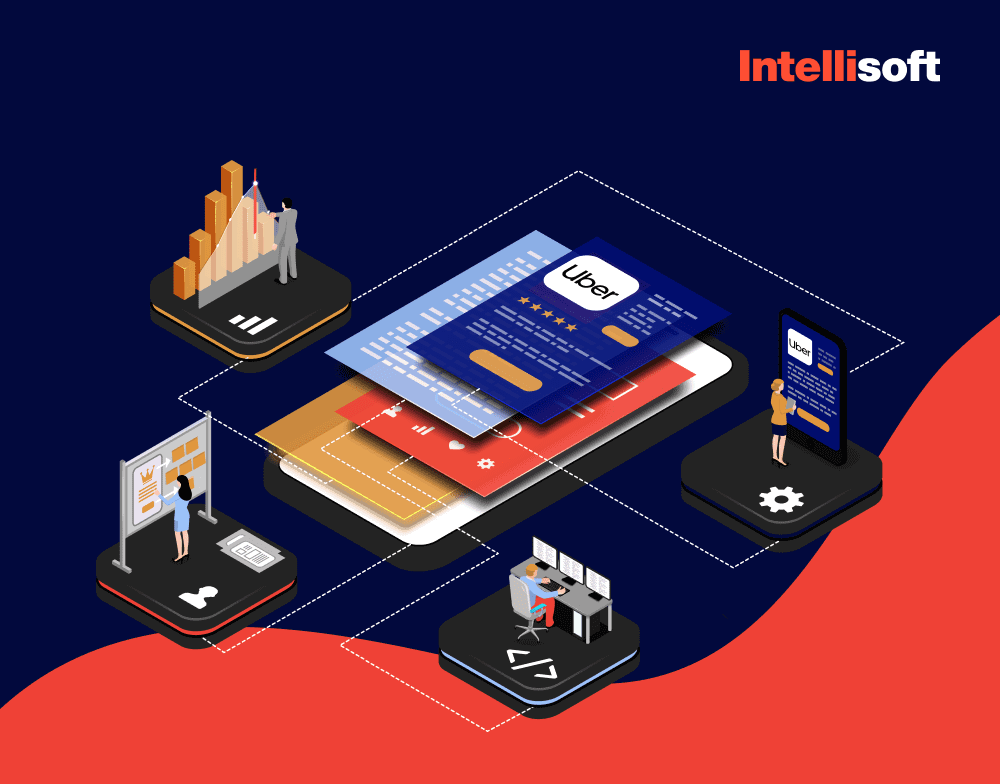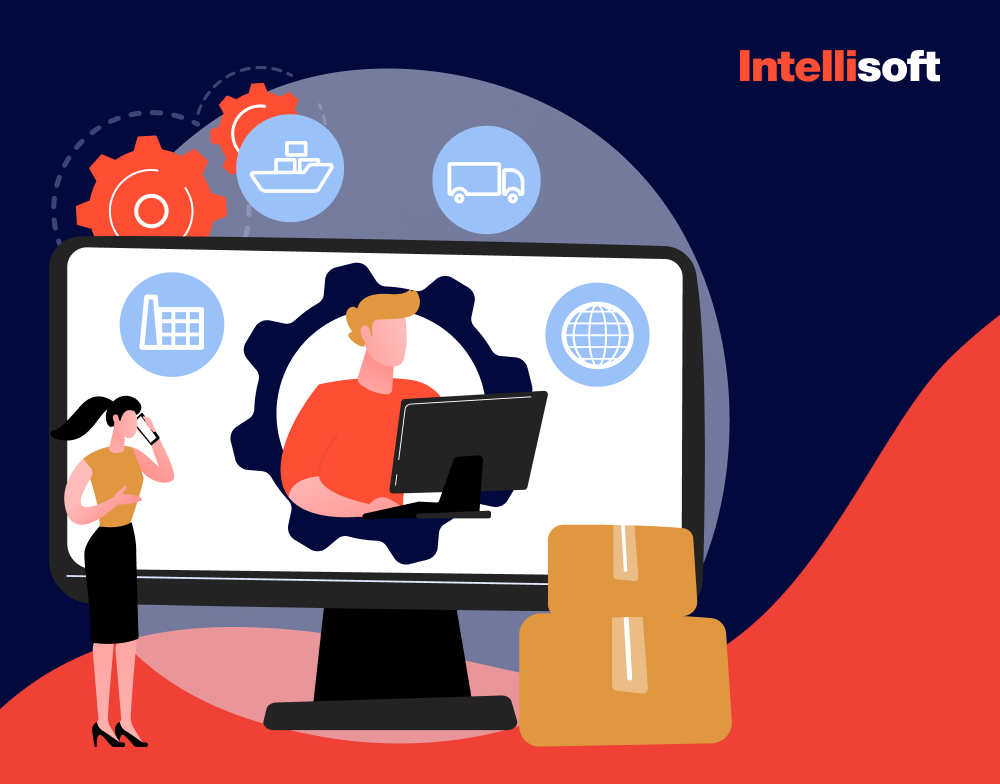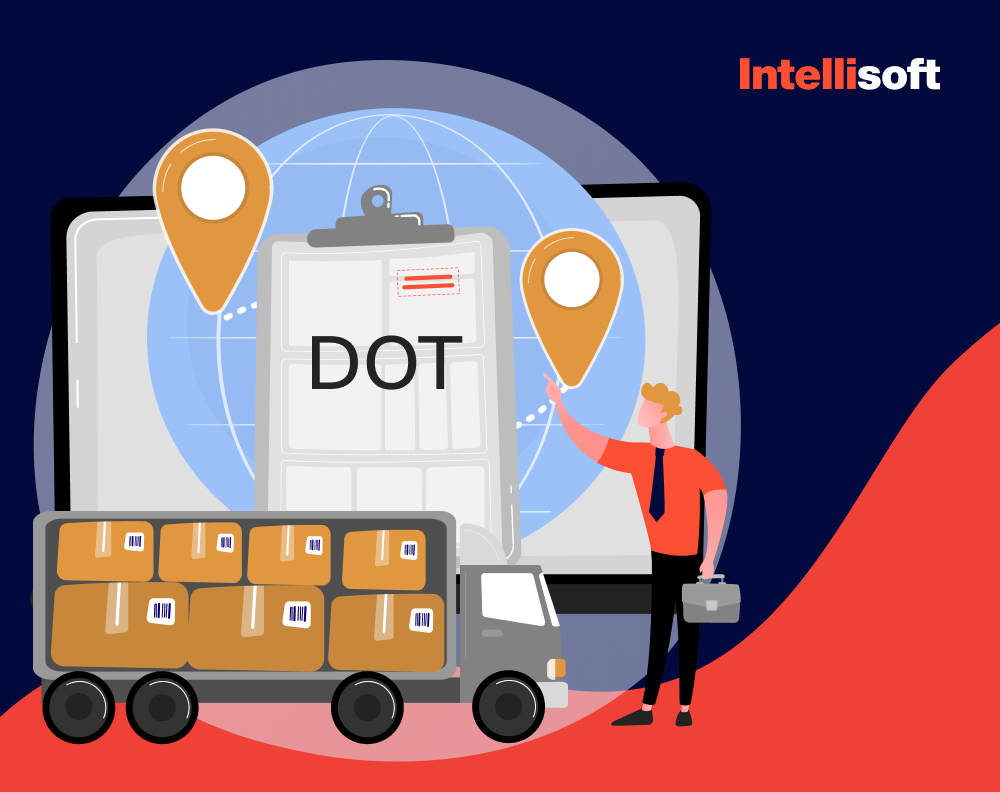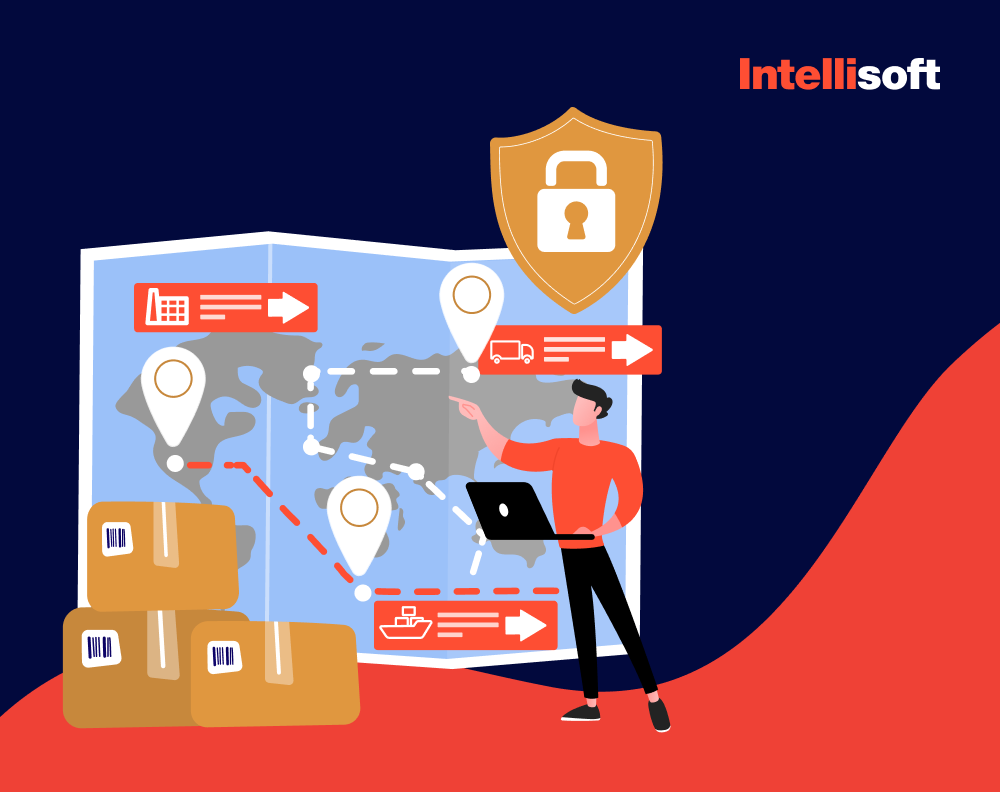Imagine a world where your logistics operations are as smooth as a well-oiled machine free from hiccups and delays, achieving seamless efficiency from point A to point B. This scenario is not a fantasy – it’s a tangible reality made possible through the best freight forwarding software. At IntelliSoft, we are dedicated to designing software solutions that simplify supply chains‘ often complex and chaotic domain into streamlined, manageable processes. We achieve these results thanks to optimizing route planning, managing inventory effectively, and ensuring compliance.
To be successful in global trade, you need to harness technology to your benefit. IntelliSoft’s logistics solutions streamline operations and provide key strategic insights that can drive your business forward. Explore this article to learn how our freight forwarding software solutions can transform operations, cut costs, and boost service delivery.
Table of Contents
The Role of Freight Forwarders in the Supply Chain
Freight forwarders are often compared to conductors in the world of shipping. They masterfully coordinate the movement of goods across borders and different transport modes. These specialists are links between shippers, exporters or importers, and the carriers transporting their goods. Their primary skill lies in untangling the complex web of global logistics, ensuring a smooth flow of goods from start to finish.
A key task for freight forwarders is securing cargo space. They negotiate with carriers to secure the most favorable rates and schedules, ensuring that shipments are efficient and cost-effective. This task requires a deep understanding of shipping dynamics and the use of long-standing relationships.
The paperwork required for international shipping can be overwhelming. Freight forwarders manage all necessary documentation, from bills of lading to customs declarations and beyond. They are meticulous in ensuring that all paperwork complies with international laws and regulations, helping to prevent expensive and time-consuming delays.
Freight forwarders are also experts in visibility and tracking. They keep shippers updated in real time about the status of their shipments. This level of transparency is vital for businesses to strategize their operations and align expectations with their customers.
Risk management is another critical area in shipping. Freight forwarders identify and mitigate potential risks related to transportation, such as damage, loss, or delays. They often secure suitable insurance, providing their clients with both peace of mind and financial protection.
When unexpected issues occur, freight forwarders must report and solve them. Whether it’s a problem at customs or a disruption in the supply chain, they are adept at finding effective solutions quickly.
Challenges Freight Forwarders Face Without Digital Tools
Freight forwarders face many problems when they lack the support of advanced freight management software. Let’s explore the significant challenges they encounter due to the absence of such digital tools.
Struggle for Real-Time Visibility
One of the most daunting challenges is achieving real-time visibility into the status and location of shipments. Freight forwarders need to meticulously track multiple shipments across various transportation modes. Without specialized freight software, obtaining current information becomes complex and often inaccurate, resulting in inefficiencies and customer dissatisfaction.
The Burden of Manual Data Entry
Traditional approach without the use of accounting software for freight forwarding companies involves a lot of paperwork, including bills of lading and customs declarations. Managing these documents takes considerable time and increases the likelihood of human error. Such errors can lead to misplaced documents, shipment delays, and potential financial penalties.
Limited Access to Analytics and Reporting
Robust analytics and reporting capabilities are essential for optimizing operations and driving business growth. These tools assist in identifying operational trends, tracking performance, and making informed decisions. Lacking freight software, these analytics tend to be rudimentary, impeding the effective analysis and enhancement of operational procedures.
Absence of Automation
The complexities of freight forwarding operations, involving numerous stakeholders and processes, require high automation for efficiency and accuracy. Manual handling of these tasks increases labor costs and the risk of operational errors. Without automation, productivity can suffer significantly, and operational costs may increase.
Challenges in Communication Management
Effective communication is crucial in the freight forwarding industry, where coordination with various stakeholders across different time zones is routine. Without centralized freight software, managing these communications can become chaotic, leading to misunderstandings, delays, and even contractual penalties.
Without digital tools, freight forwarders find it challenging to operate efficiently and competitively. By investing in the right freight forwarding software solutions, they can significantly enhance their operational capabilities, reduce costs, and improve overall service delivery.
What is Freight Forwarding Software?
Ground, ocean, or air freight forwarding software is a sophisticated tool designed to make transporting goods from one location to another smoother and more manageable. It supports companies in managing the complexities of imports and exports by overseeing everything from the initial quoting to the preparation of documentation and from tracking to tracing shipments. This software is an essential link between shippers and various transportation services, simplifying the logistics of moving goods globally.
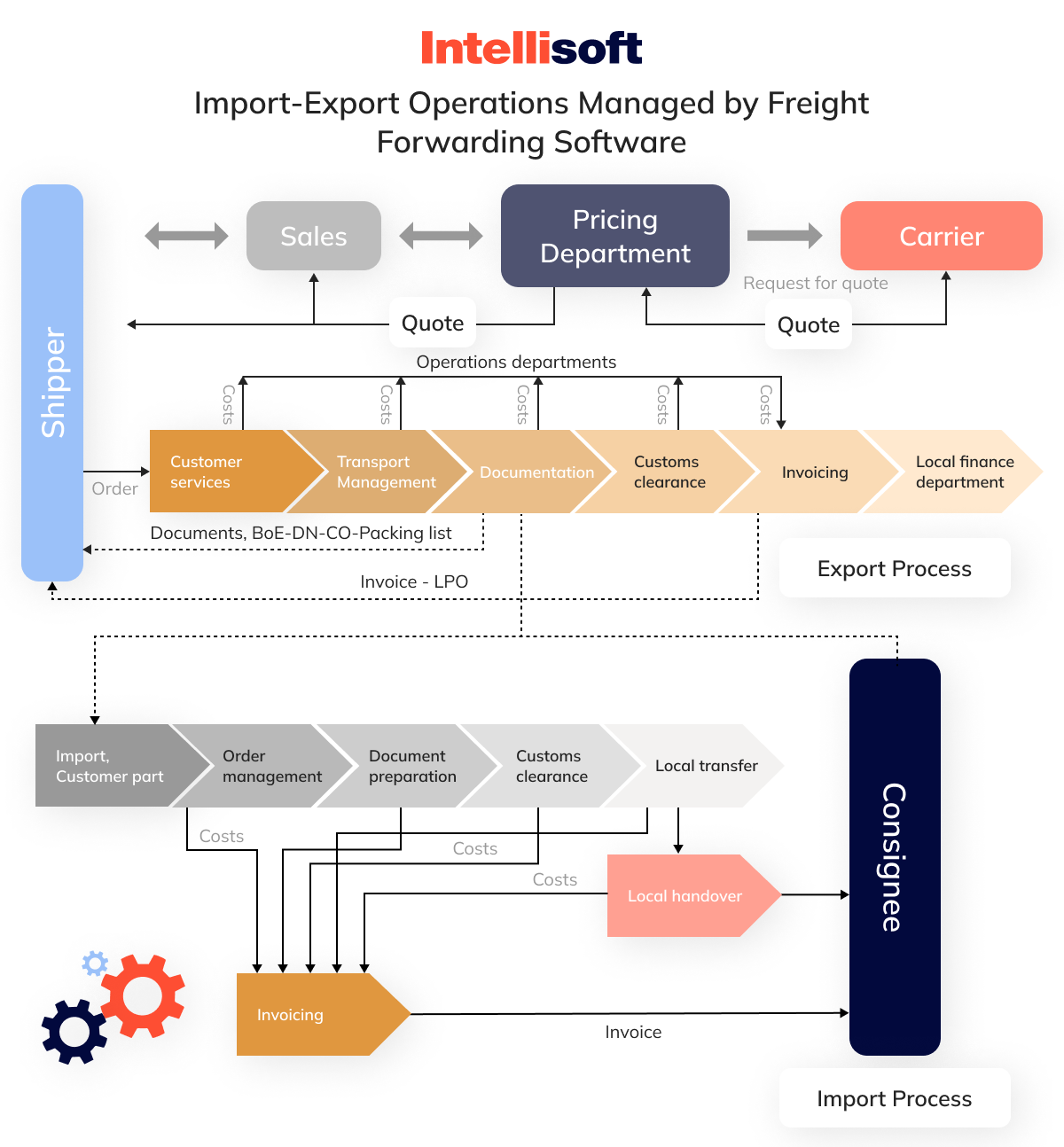
How Does the Freight Forwarding System Software Work?
The freight forwarding system software acts as a critical intermediary between a shipper and the final destination of their goods. Businesses can use this system to organize various transportation services based on their specific requirements, including road transport, ocean shipping, or air freight. The system provides access to a network of carriers, such as air freighters, trucking companies, and ocean liners, offering options to secure the best prices and service terms.
At its core, the freight forwarding system software negotiates with these carriers to secure the most cost-effective, reliable, and fast transportation routes. This negotiation is crucial for developing logistics strategies that balance speed, cost, and reliability across various trade routes. Once the optimal carrier and route are selected, the software aids in the quoting process and helps upload all necessary documentation to ensure compliance and readiness for transport.

From the initial pickup to the final delivery, web or cloud based freight forwarding software manages the entire shipping process. It coordinates the storage and timely shipment of goods, provides real-time updates, and maintains open lines of communication among all parties involved. Essentially, this software not only boosts the efficiency of shipping operations but also significantly reduces the complexity for companies engaged in international logistics.
Types of Freight Forwarding Management Software
The freight forwarding industry greatly benefits from various management software options, each tailored to meet specific challenges and enhance various aspects of the logistics process. The wide range of these tools demonstrates the complex nature of freight forwarding accounting software, offering remarkable versatility and efficiency improvements.
Transportation Management Systems (TMS)
Transportation Management Systems are designed to streamline the entire transportation lifecycle. These systems facilitate the planning, execution, and optimization of the movement of goods. TMS solutions make managing tasks such as route planning, carrier selection, freight auditing, and payment processing easy. They are invaluable for companies aiming to improve their logistical operations and reduce transportation costs.
Warehouse Management Systems (WMS)
Focusing on a warehouse’s internal operations, Warehouse Management Systems (WMS) are pivotal in managing inventory levels, optimizing pick-and-pack processes, and overseeing goods storage. A robust WMS enhances warehousing efficiency by minimizing errors, improving inventory accuracy, and accelerating order fulfillment, which keeps goods flowing through supply chains.
Supply Chain Management Software (SCMS)
Supply Chain Management Software takes an integrated approach to managing and optimizing the complete supply chain. This software encompasses various activities, from sourcing and production to distribution and delivery. SCMS may include a freight forwarding billing software module that streamlines operations. The solution offers a comprehensive view of supply chain operations, allowing businesses to make well-informed decisions and boost efficiency. For those seeking advanced solutions in this area, IntelliSoft provides state-of-the-art SCMS capabilities.
Enterprise Resource Planning Systems (ERP)
Freight forwarding ERP software integrates various aspects of an enterprise—from purchasing and operations to distribution and logistics. ERPs act as comprehensive platforms that consolidate operational data into a unified system, offering a consistent and detailed perspective of the entire business. This integration is essential for optimizing processes and improving decision-making across the organization.
Customer Relationship Management Systems (CRM)
Although not primarily designed for logistics, Customer Relationship Management Systems are crucial in managing customer relationships in freight forwarding. CRMs are instrumental in tracking and managing customer data, interactions, preferences, and feedback, vital for enhancing service delivery and customer satisfaction.
The diverse software types available highlight the importance of selecting a solution that closely aligns with your business needs and operational challenges. Whether it’s improving transportation efficiency, streamlining warehouse operations, managing the entire supply chain, or enhancing customer relationships, the right freight forwarding management software can significantly impact your company’s performance and customer service.
Related readings:
- Last-Mile Delivery Software Development: a Complete Guide
- App for Route Planning: Finding the Ultimate Solution
- Ultimate Warehouse Optimization With Smart Warehouse Technologies
- How to Develop Logistics Management System: Timeframe, Tech Stack, and Costs
- Predictive Maintenance Software Development: a Complete Guide
Key Features of Freight Forwarding Management Software
The perfect freight forwarding management software is a comprehensive solution designed to streamline every aspect of the logistics process under a single unified system. This software integrates a variety of functionalities, serving as the cornerstone of efficient freight management. Let’s discuss some critical freight forwarding software features that make freight software effective.
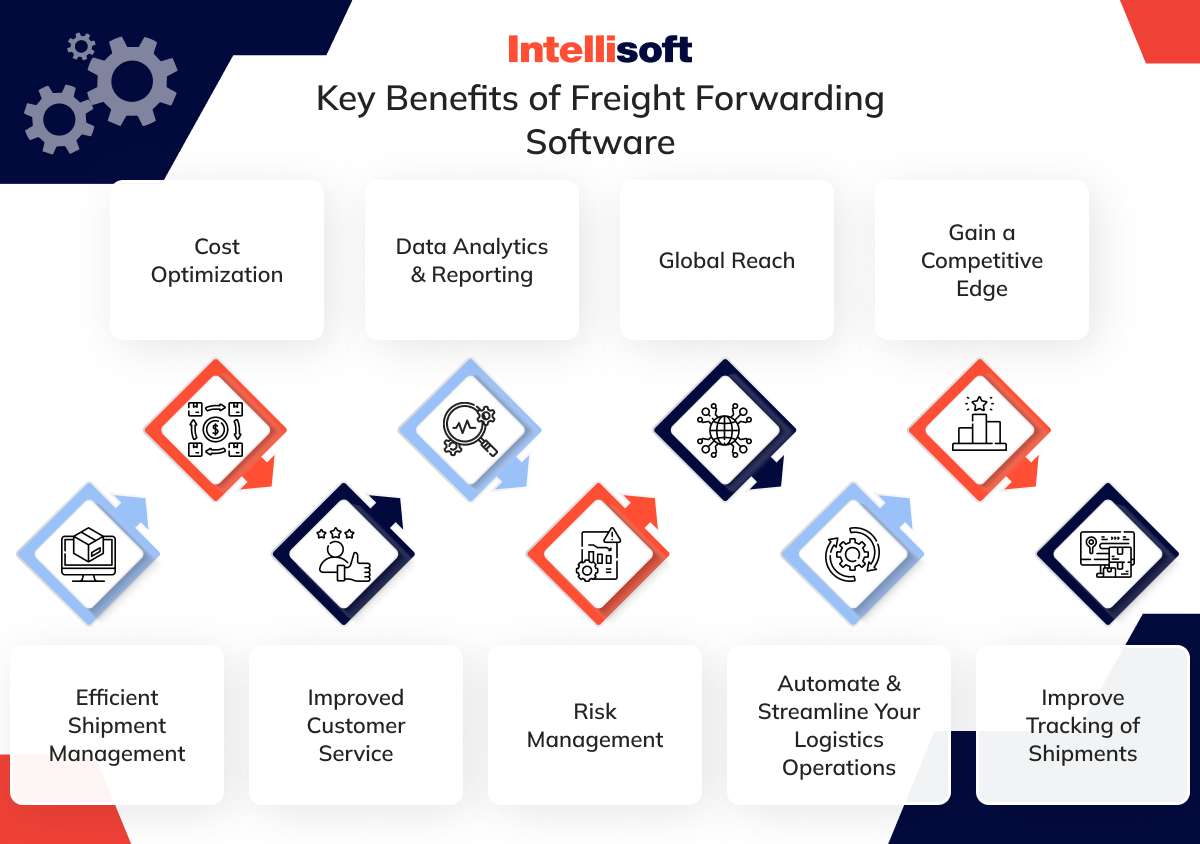
Centralized Dashboard
At the core of the best freight forwarding software is a user-friendly centralized dashboard. It provides a comprehensive overview of all logistics operations, allowing users to easily monitor shipment statuses, manage inventory, oversee financials, and access important documents. This dashboard is crucial for enhancing decision-making by offering real-time insights into every aspect of the freight forwarding process.
Shipment Management
Efficient shipment management is vital for any freight forwarding operation. The software supports the planning, execution, and real-time tracking of shipments across different transportation modes, including air, sea, rail, and road. Features such as route optimization and timely updates are essential for streamlining operations and ensuring efficient and cost-effective deliveries.
Documentation and Compliance
Advanced freight software excels in handling documentation efficiently. It simplifies the creation, storage, and management of crucial shipping documents such as bills of lading, commercial invoices, and packing lists. Moreover, the software ensures compliance with international trade regulations and customs requirements, reducing risks associated with global shipping.
Inventory Management
Robust inventory management features are integral to software solutions for freight forwarding. This functionality offers detailed visibility into stock levels and warehouse storage locations, enabling efficient inventory asset management, stock rotation, and prompt order fulfillment. Effective inventory management is key to maintaining the flow of goods and avoiding stockouts or surplus inventory.
Financial Management
Comprehensive financial management tools combine all freight operations’ financial aspects, including invoicing, payments, and expense tracking. The software facilitates detailed financial reporting and analysis, which is crucial for budgeting and controlling costs, helping businesses maintain profitability and financial health.
Customer Relationship Management (CRM)
Embedded CRM systems within cloud or web based freight forwarding software improve customer service by managing detailed customer information, tracking previous interactions, and facilitating interdepartmental communication. This ensures better relationships with customers and meets their needs promptly and efficiently.
Integration and API
It is crucial to be able to integrate seamlessly with external applications and services. The best freight forwarding software often includes robust API capabilities, allowing for smooth interactions with other business systems such as ERP or TMS, and various carrier platforms. This integration enhances operational efficiency at all levels.
By incorporating these key features, freight forwarding management software optimizes logistics operations and significantly enhances efficiency, customer satisfaction, and overall business performance.
Main Differences Between SaaS Logistics Systems and Custom Logistics Software
Choosing between SaaS logistics systems and custom freight forwarding and logistics software involves weighing factors such as customization, costs, implementation, and control. Each type offers unique advantages and challenges, influencing a company’s decision based on its requirements, budget, and strategic objectives.
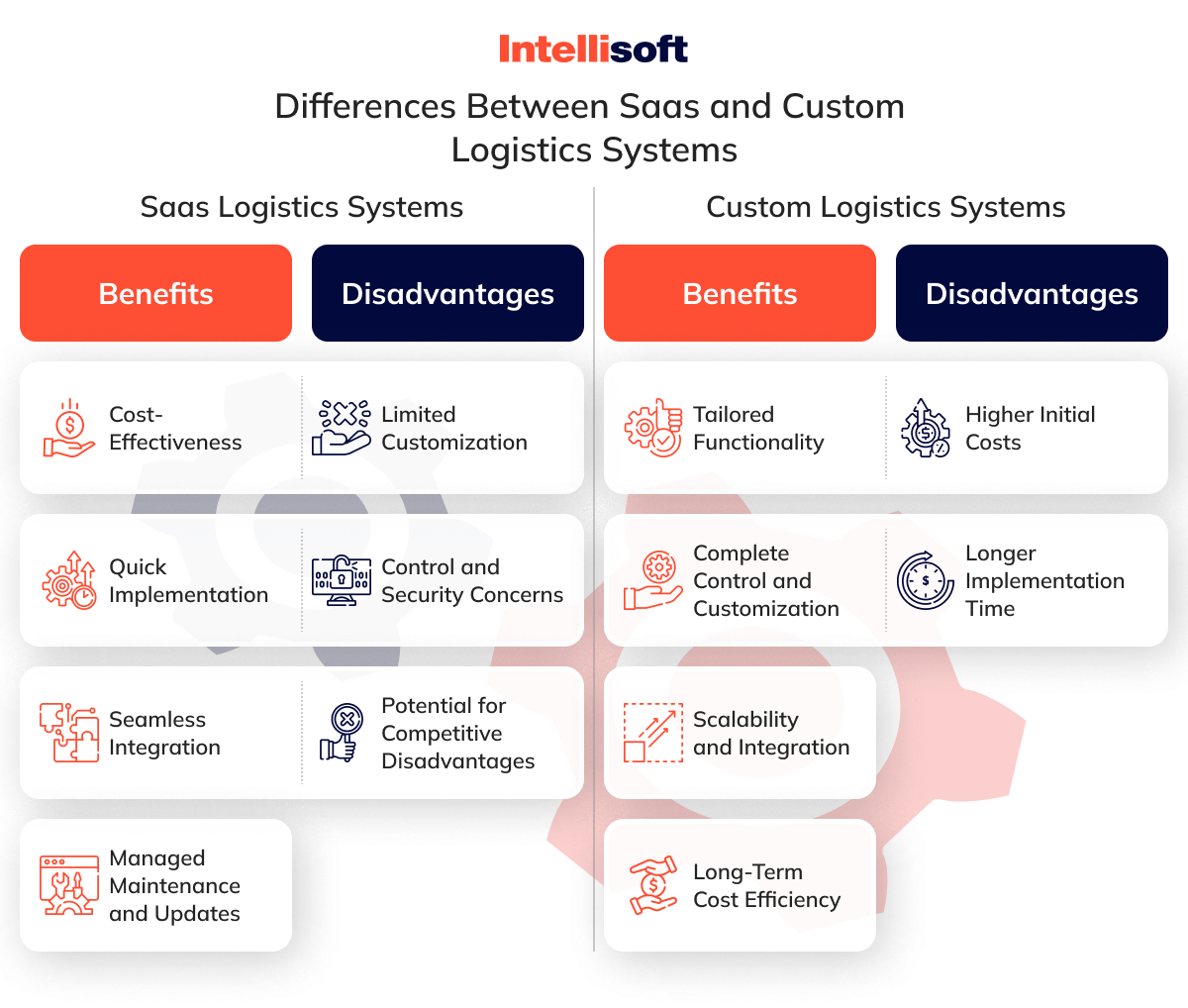
Benefits of SaaS Logistics Systems
SaaS logistics systems often have lower initial costs due to their subscription-based pricing model. This makes advanced logistics capabilities accessible without a significant upfront investment. Being cloud-based and pre-developed, these systems allow faster deployment than custom solutions. The provider also handles ongoing maintenance and updates, easing IT management for users.
SaaS systems are designed to integrate easily with existing software, ensuring that data moves smoothly between systems without extensive customization. With SaaS, the service provider manages all maintenance, updates, and technical support, reducing the workload on a company’s internal IT team.
Disadvantages of SaaS Logistics Systems
SaaS solutions generally offer less customization flexibility. Companies may need to adapt their processes to fit the software rather than have it tailored to their specific needs. Using a SaaS platform can raise data security and privacy concerns, particularly when sensitive logistics data is stored in the cloud. Companies also have less control over the software’s features and updates. The software provider might offer the same solutions to multiple clients, which could lead to competitors’ replication and use of specialized business processes.
Benefits of Custom Shipping and Freight Forwarding Software
Custom software is developed specifically to meet a business’s unique requirements, ensuring all features perfectly align with operational needs. With custom solutions, businesses have full control over their software environment, including updates, features, and security, accommodating changes as the business evolves.
Custom solutions can be scaled and modified to meet evolving business demands and integrate seamlessly with existing internal systems. Although custom software has a higher initial investment, there are no ongoing subscription fees, potentially making it more cost-effective in the long run.
Disadvantages of Custom Logistics Software
Custom software development requires a larger upfront investment due to the need for bespoke development and specialized expertise. The custom software development and deployment process takes longer and requires detailed planning and testing to ensure it fulfills all specific business requirements.
The decision between SaaS and custom logistics software largely depends on your company’s immediate and future needs, budget constraints, and desired level of control over logistics processes. Each option has distinct advantages that may make it preferable under different circumstances.
Choosing Between Custom Software Solutions for Freight Forwarding and SaaS
Deciding between SaaS logistics systems and custom logistics software requires a deep understanding of your business’s unique needs, budget limitations, and strategic goals. Each option offers distinct advantages and can be more suitable for different business environments and operational priorities.
Custom International Freight Forwarding Software
Consider custom software when your business operations demand specific functionalities that off-the-shelf software cannot provide. Custom software is built to fit perfectly with your workflows and specialized requirements. Custom development is advisable if your company has unique processes that a standard freight forwarding software solution cannot support. This approach ensures that your specific operational nuances are fully addressed, boosting efficiency and performance.
Custom software is preferable when your business requires complete control over software features and integration with existing systems. It provides flexibility for scalability and future adjustments as your business evolves or shifts its focus.
Opting for custom software generally involves a higher initial investment and a longer setup time but yields greater long-term benefits by delivering exactly what your business needs without compromise.
SaaS (Software as a Service)
Opt for SaaS when looking for a solution with lower initial costs. Freight forwarding software for small business offers predictable, subscription-based pricing, making it easier for businesses not prepared to invest in IT infrastructure. SaaS is ideal if your business needs to become operational quickly without the complexities of a prolonged implementation period. Quick deployment is especially advantageous for companies with limited IT resources or those needing to scale operations rapidly.
SaaS solutions are inherently flexible and scalable, allowing businesses to adjust their usage as needed and expand as the company grows or demand increases. Additionally, the provider manages software maintenance and updates, easing the IT burden.
The choice between SaaS and custom logistics software largely hinges on your business’s specific needs and circumstances. Consulting with logistics experts or software providers can offer valuable insights and assist you in making an informed decision that supports your strategic objectives. Whether it’s the tailored functionality and control provided by custom software or the cost-effectiveness and ease of use offered by SaaS, each option has advantages and ideal scenarios.
Conclusion
Choosing the right ground, ocean, or air freight forwarding software is crucial for boosting the efficiency and effectiveness of your logistics operations. Whether you choose the flexibility and cost-effectiveness of SaaS solutions or the customized functionality and control provided by custom software, your decision should align with your business’s specific requirements, operational scale, and strategic ambitions.
At IntelliSoft, we are well-versed in the complexities and demands of the logistics sector. Our expertise in crafting advanced logistics and cloud or web based freight forwarding software solutions ensures your business has the tools to thrive in a competitive marketplace. We provide both bespoke software development services and sophisticated SaaS solutions tailored to meet the specific needs of your operations.
Discover how IntelliSoft can transform your logistics operations by improving visibility, streamlining processes, and fostering growth. Let us assist you in overcoming the complexities of freight forwarding with software designed for success. Partner with us to make a substantial stride in optimizing your logistics operations for the challenges of tomorrow.
Are you ready to revolutionize your freight forwarding operations? Contact IntelliSoft any time to explore our state-of-the-art logistics software solutions!


